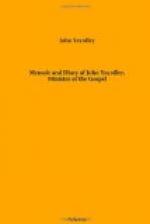And where, says J.Y., we had several solemn and edifying occasions; and as our being there became more known the attendance increased, so that the last gathering was quite a large one, and peculiarly quiet and satisfactory. Among some meetings which we appointed in the neighborhood two were held in the temple of the Protestant Church, which was a mark of great liberality; these two occasions were peculiarly favored. In the latter B.C. alluded to the persecution he had had to endure on account of the disuse of the Supper and Baptism. He boldly avowed the conviction he felt as to the non-use of these things, and that the preaching of the gospel ought to be free. I have seldom been in a district where there is more openness for the gospel message in its simplicity, than in this mountain region.
From Valence, John Yeardley returned direct to England, only stopping at Friedrichsdorf. where he visited the boarding-school.
I reached my home, he says, on the 24th of the Eleventh Month, with a thankful heart to my Heavenly Father for his merciful preservation.
CHAPTER XX.
FROM HIS RETURN FROM RUSSIA TO HIS LAST JOURNEY.
1853-1858.
John Yeardley had scarcely returned to England before war was declared with Russia. The confirmation he received from this lamentable event, that his journey had been made at the opportune time, filled his heart with gratitude. The work he had been able to do had been small, but he had the satisfaction of knowing that it had been accomplished at the only juncture in which it would have been practicable.
The year 1853, he writes, closed with many mercies to a poor unworthy servant. I consider it a great blessing to have accomplished the visit through Russia and to Constantinople before the horrible war broke out. What a frightful state are things in at the present moment!—no access could be had to those countries.
In the Spring of 1854 he spent some time at Bath. He attended, whilst there, a public meeting appointed by Sarah Squire, in which he had a testimony to offer in the gospel. Hearing afterwards that a military man who was present had been brought to conviction by the doctrine which had been declared, J.Y. noted in his Diary the subject on which he had preached.
4 mo. 2.—I recollect, he says, alluding to the awful state of the times in which we live, and the need of a refuge in God, and the blessedness of the consolations of the Holy Spirit in a time of trouble. That the Spirit of God was the first agent in the work of man’s salvation, bringing to the Saviour who died for sinners: the Father drawing to the Son, the Son perfecting the work, and presenting each member of the living church without spot or wrinkle to the Father. Blessed unity of Father, Son, and Holy Spirit! The Father creating, the Son redeeming, the Holy Spirit sanctifying.




